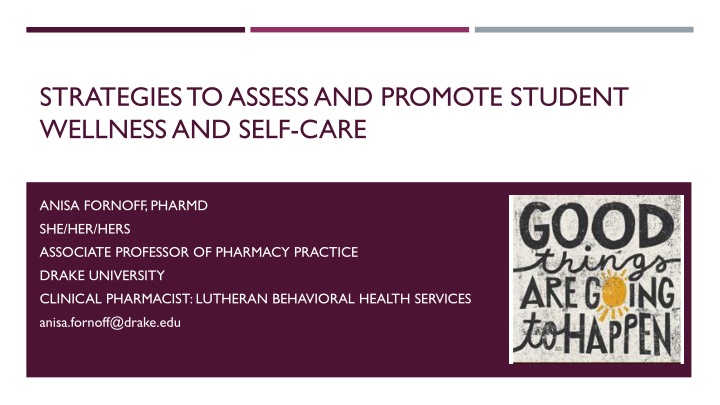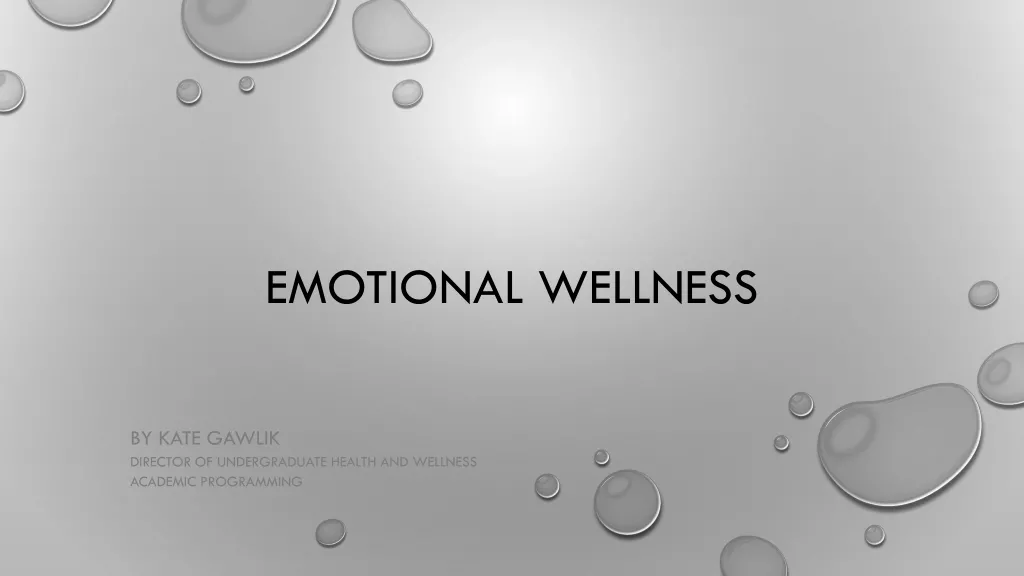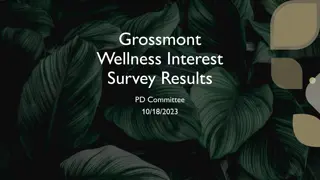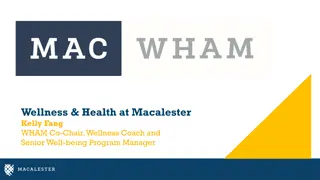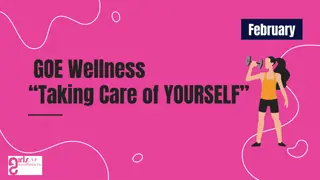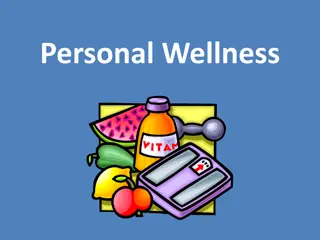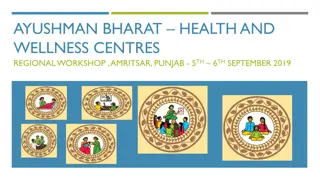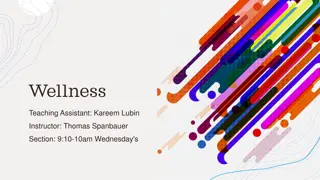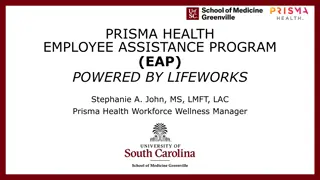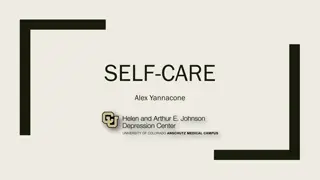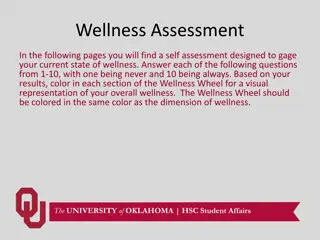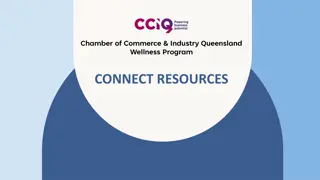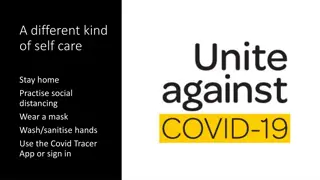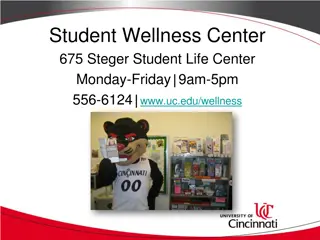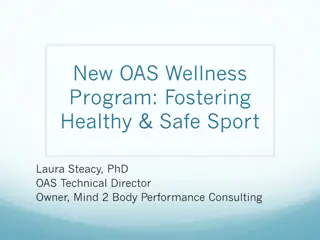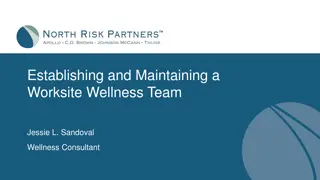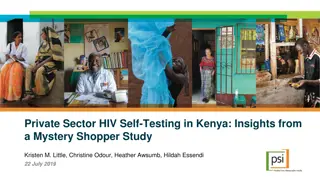Strategies to Assess and Promote Student Wellness and Self-Care Discussion
Focus on implementing wellness assessments, self-care activities, and communication strategies for student well-being. Recognize mental health issues on campus, refer students to resources, and describe wellness initiatives. Define well-being, practice gratitude, identify wellness strengths, and explore dimensions of wellness based on a Drake CPHS survey in spring 2019.
Download Presentation

Please find below an Image/Link to download the presentation.
The content on the website is provided AS IS for your information and personal use only. It may not be sold, licensed, or shared on other websites without obtaining consent from the author.If you encounter any issues during the download, it is possible that the publisher has removed the file from their server.
You are allowed to download the files provided on this website for personal or commercial use, subject to the condition that they are used lawfully. All files are the property of their respective owners.
The content on the website is provided AS IS for your information and personal use only. It may not be sold, licensed, or shared on other websites without obtaining consent from the author.
E N D
Presentation Transcript
STRATEGIES TO ASSESS AND PROMOTE STUDENT WELLNESS AND SELF-CARE ANISA FORNOFF, PHARMD SHE/HER/HERS ASSOCIATE PROFESSOR OF PHARMACY PRACTICE DRAKE UNIVERSITY CLINICAL PHARMACIST: LUTHERAN BEHAVIORAL HEALTH SERVICES anisa.fornoff@drake.edu
OUR DISCUSSION TODAY Many of us have recognized the increase in mental health issues on our campus. This session will focus on easy to implement wellness assessments, self-care activities, and communication strategies related to overall student well-being. Recognizing when to refer students to campus resources will be discussed. The session will also describe student wellness initiatives in the College of Pharmacy and Health Sciences.
REFLECT What is the definition of well-being? Describe your overall well-being in 6 words or less Share with a partner/group Does your description match what you wish you could describe?
Wellness is defined as an active process of becoming aware of and making choices towards a healthy and fulfilling life.
What are your core wellness strengths?
DRAKE CPHS SURVEY SPRING 2019 Total of 514 students completed survey 379 female, 133 male Pre-Pharmacy/Pharmacy, Pre-OT/OT, Health Sciences: Clinical, Health Sciences: Health Management/Pre-AT Lesson learned many students are somewhat aware of services and rarely use resourses Full data results not included in this handout. Thank you to Chris Wing and Nora Stelter
DRAKE CPHS SURVEY SPRING 2019 Wellness is often thought of as just physical wellness or exercise and nutrition, but it is so much more. Wellness is defined as an active process of becoming aware of and making choices towards a healthy and fulfilling life. The National Wellness Institute identifies six dimensions of wellness: 1) occupational/academic 2) physical 3) social 4) emotional 5) intellectual 6) spiritual
DRAKE CPHS - INITIATIVES College student edition!
HOW INVITING IS YOUR OFFICE ? How fast do you escape the classroom? Where is your cell phone?
Opportunity to share info outside your office space
KNOW YOUR ACTION PLAN Know your limits Know what you are required to report Resources on campus Resources in the community Have information readily available Cell phone contacts, folder in office, ..
9 HEALTHY WAYS TO COMMUNICATE (STIRFRY SEMINARS) 1. Reflect back what is being said. Use their words, not yours. 2. Begin where they are, not where you want them to be. 3. Be curious and open to what they are trying to say. 4. Notice what they are saying AND what they are not. 5. Emotionally relate to how they are feeling and nurture the relationship. 6. Notice how you are feeling. Be honest and authentic. 7. Take responsibility for your part in the conflict or misunderstanding. 8. Try to understand how their past affects who they are and how those experiences affect their relationship with you. 9. Stay with the process and relationship, not just the solution.
THE ART OF MINDFUL INQUIRY What I heard you say was Tell me more about what you meant by . What angered you about what happened? What hurt you about what happened? What s familiar about what happened? How did that affect you? How does it affect you now? What do you need/want? The Art of Mindful Facilitation, Lee Mun Wah
QUESTIONS TO START YOUR STUDENT APPOINTMENTS What has been the best part of the semester so far? What are you proud of? What else has been going well? What has been the biggest challenge? In what ways can I be the most helpful for you today?
Where do I start?
RELATIONSHIP VIOLENCE AND SEXUAL ASSAULT Title IX and Sexual Assault Response and Prevention The University has resources available for students who have experienced sexual or interpersonal misconduct, which can include sexual harassment, sexual assault, dating violence, and stalking, for example. Some resources are legally confidential, which means personal information will not be shared with anyone else. Other non-confidential (yet still private) resources can explain how to locate support resources, file a complaint within the university, or file criminal charges these non-confidential resources need to share incidents of sexual and interpersonal misconduct with the Title IX Coordinator. As an instructor, I am non-confidential; however, please know that sharing with the university does not mean the individual must participate in a formal university or criminal process; an individual could request confidentiality through the University, for example. Other services the university can provide include safety planning, counseling, disability or immigration services and assistance in academic and housing accommodations as needed. University contacts: Resources and reporting options can be found on the Title IX webpage at www.drake.edu/titleix. Violence Intervention Partner (V.I.P.) provides peer-based 24/7 confidential support and advocacy services. To access a V.I.P. advocate call or text 515-512-2972. NEW HIRE SOON, Title IX Coordinator: 271-2982 or titleix@drake.edu Lynn Cornelius, Violence Prevention Coordinator, prevention@drake.edu or ext 4141. Resources and Reporting for Sexual and Interpersonal Misconduct Finding Support & Understanding Confidentiality Confidential Resources When discussing sexual or interpersonal misconduct, which includes sexual assault, sexual harassment, sexual exploitation, dating violence, domestic violence, or stalking, the idea of confidentiality is important. Communications with the resources listed to the right are confidential under Iowa law they cannot share information they received in confidence. Other University employees, such as a professor, RA, or coach, cannot provide this confidentiality and must inform the Title IX Coordinator, who will reach out with resources and options this information is kept private. Reporting to Law Enforcement or Public Safety Drake University Peer Advocacy and Support Violence Intervention Partner (VIP) 515-512-2972* call/text Professional or Pastoral Counseling 515-271-3864 Drake University Counseling Center Employee Assistance Program 515-244-6090* Crisis Observation Center 515-282-5742* Drake University Spiritual Counselor, Ted Lyddon-Hatten 515-274-3133 Community Advocacy and Support Individuals may choose whether they want to notify police or Drake Public Safety. Contacting Drake Public Safety or police for assistance does not mean you must file criminal charges. Both Drake Public Safety and Des Moines Police can help with questions about no-contact orders, safety planning, and the criminal process. In some cases, Des Moines Police may be able to offer additional assistance (if the survivor lives off campus or if the other individual is not affiliated with the University, for example). The University can assist in notifying police or individuals may decline to do so. Polk County Crisis and Advocacy 515-286-3600* Office hours in Cowles Library 209 Wednesday 3:00-4:30 (fall and spring terms) Domestic Violence Services (CFI) 515-243-6147* L.U.N.A. Latina Sexual and Domestic Violence Services 866-256-7668* Des Moines Police 911 (emergency) or 515-283-4864 or 515-283-4811 1-866-881-4641* Monsoon United Asian Women 515-255-5430* Nissa African Women s Project Drake Public Safety 811 (emergency) or 515-271-2222 Medical care Student Health Center 515-271-3731 Planned Parenthood** 877-811-7526 Anonymous Reporting through Drake Broadlawns Medical Center** 515-282-2200* Anonymous reports can be made online. Drake respects a person s choice to proceed anonymously; please know that the University will respond to the report but its response could be limited. http://www.drake.edu/ethicspoint/ Iowa Lutheran Hospital** 515-263-5120* Iowa Methodist Hospital** 515-241-6213* Mercy Medical Center** 515-247-3121* **Free sexual assault exam/medication, no report to insurance Formal and Informal Complaint Resolution *Available 24/7 Drake respects a person s preference on how to proceed when the University learns of misconduct. Know that formal and informal processes may be available depending on the information shared. The Title IX Coordinator, Dean of Students, Public Safety, or Violence Prevention Coordinator can discuss these options. An advocate is a confidential resource who can provide support, talk through options, and address any concerns related to sexual or interpersonal misconduct. For access to the complete policies, rights, and lists of resources and support, visit www.drake.edu/titleix
How to re- word when talking with others
THE UNIVERSITY COUNSELING CENTER (UCC) The Counseling Center offers to all currently enrolled Drake students a variety of counseling services. Depending on the student's need, individual, couple, family, or group counseling may be provided. The UCC is available for workshops, training, psychological testing, and for referral information. In addition, we offer consultation services to students, staff, and faculty who might have questions about student mental health issues or topics. Drake University Counseling Center 3116 Carpenter Avenue Des Moines, Iowa 50311 (515) 271-3864 Hours: M-Th from 8:30am to 5:00pm, Friday 8:30 to 3pm http://www.drake.edu/counselingcenter/
PUT THESE CONTACT NUMBERS IN YOUR PHONE.NOW Crisis Text Line (Text HELLO to 741741): Drake is partnering with the nationally known group, Crisis Text Line, to provide an additional service for our students. Crisis Text Line Counselors graduate from a 30-hour program that includes: video modules that cover (a) specific skills such as good contact techniques; and (b) issues such as self-harm, suicide, depression, bullying, and LGBTQ issues, as well as quizzes, role plays, and observations shifts. Their training has been vetted by representatives from national organizations like American Foundation for Suicide Prevention, and RAINN (Rape, Abuse, and Incest National Network). This is a free and confidential service. Remember, if this is an emergency, please contact Drake Public Safety at 515-271-2222 or 9-1-1.
AFTER HOURS CARE Students who need emergency mental health care when the University Counseling Center is closed should call Drake Public Safety at 515-271-2222 or 911. All off-campus treatment is the financial responsibility of the student however the Observation Center is free of charge. The Crisis Observation Center is intended to meet the needs of individuals who are experiencing an acute behavioral health stressor that impairs the individual s capacity to cope with his/her normal activities of daily living. The goal of the Crisis Observation Center is to offer a place for individuals to seek crisis intervention services and stabilize them quickly so they can return to the community. The length of stay is up to 23 hours. Services offered include a nursing assessment, care/service coordination, crisis intervention therapy, and access to a psychiatric prescriber if needed. Staff include registered nurses, Master s level psychotherapists, psychiatric technicians, and care/service. These services are offered in a safe and supportive environment. Crisis Observation Center open 24/7. Broadlawns Hospital, West entrance, 1801 Hickman, DM Phone: 515-282-5742 Lutheran Hospital is a local center for inpatient psychiatric services. Mercy HospitalAccess to treatment for mental health illness or substance abuse is available 24 hours a day, seven days a week by calling the Mercy Help Center at (515) 271-6111 or toll-free (800) 595-4959.
What may work for you? Who can you contact for support? Identify your social supports
MENTAL HEALTH: ALCOHOL/SUBSTANCE USE DISORDERS
The No t-To -Do List OTHER PEOPLE S RESPONSIBILITIES EVERYTHING ON MY PLATE STUFF THAT S OUT OF MY CONTROL STUFF THAT DRAINS ME STUFF THAT DOESN T NEED TO GET DONE ! ! sagegrayson.com
What do you do for self- care? Not the same for everyone!
You cant determine what works for others help them brainstorm. Just because you run doesn t mean I want to train for a marathon
